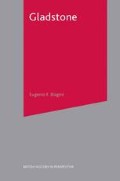Abstract
In all our Endeavours let us always act in such a manner as to be able to look up to the director of a most Wise and Benevolent Providence, with grateful heart in the days of Prosperity, and humble submission and resignation in the time of Adversity Comforting ourselves in this, that He will make everything work together for good to them that Love and Fear him.1
Preview
Unable to display preview. Download preview PDF.
Notes
Thomas Gladstones to his son John, 31 March 1787, cit. in S. G. Checkland, The Gladstones: A Family Biography 1764–1851 (1971), p. 408.
M. R. D. Foot, Gladstone Diaries, vol. i (1968), p. 29.
Gladstone in 1831, cit. in H. C. G. Matthew, Gladstone, vol. i (1986), p. 34.
D. W. Bebbington, William Ewart Gladstone. Faith and Politics in Victorian Britain (1993), p. 237.
Matthew, Gladstone Diaries, vol. xiv (1994), p. 321.
J. Brooke and M. Sorenson (eds), Prime Minister’s Papers: Gladstone, vol. i (1971), p. 36; cf. Foot, Gladstone Diaries, vol. i (16 Oct. 1832).
In Morley’s words, with which Gladstone strongly agreed: Morley/ Gladstone dialogues at Biarritz (16 Dec. 1891), in A. Briggs (ed.), Gladstone’s Boswell. Late Victorian Conversations (1984), p. 197.
Matthew, Gladstone, vol. i, p. 199.
Cit. in C. Cruise O’Brien, ‘New Introduction’ to M. Arnold (ed.), E. Burke, Irish Affairs (London) 1988, p. xiii; cf. E. Burke, ‘A Letter from Mr. Burke to a Member of the National Assembly’ (1791), in Reflections on the French Revolution and Other Essays (Everyman’s edition, 1943), pp. 276–8.
Morley, Gladstone, vol. ii, pp. 240–1.
Morley/Gladstone dialogues at Biarritz (16 Dec. 1891), in Briggs (ed.), Gladstone’s Boswell, p. 201; emphasis in the text.
Cit. in Morley, Gladstone, vol. i, p. 183.
See the memos dated 3 Feb., 29 Apr. and 3 May 1845, in J. Brooke and M. Sorensen (eds), The Prime Ministers’ Papers: W. E. Gladstone, II: Autobiographical Memoranda (1972), pp. 273–9.
Checkland, The Gladstones, p. 395.
The obvious examples are Sir Charles Dilke in 1886 and Charles Stewart Parnell in 1890–91, although it should be observed that in the earlier part of the century Lord Melbourne survived scandal, while Palmerston and Hartington were unscathed by their extramarital affairs.
J. Marlow, Mr and Mrs Gladstone. An Intimate Biography (1977), p. 28.
Copyright information
© 2000 Eugenio F. Biagini
About this chapter
Cite this chapter
Biagini, E.F. (2000). The Rising Hope. In: Gladstone. British History in Perspective. Palgrave, London. https://doi.org/10.1007/978-1-349-87867-3_2
Download citation
DOI: https://doi.org/10.1007/978-1-349-87867-3_2
Publisher Name: Palgrave, London
Print ISBN: 978-0-333-61353-5
Online ISBN: 978-1-349-87867-3
eBook Packages: Palgrave Political & Intern. Studies CollectionPolitical Science and International Studies (R0)

